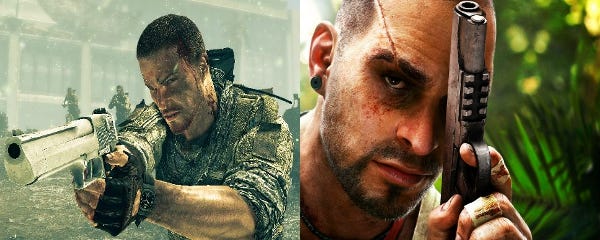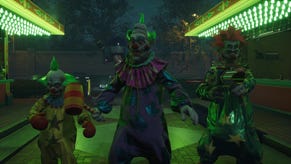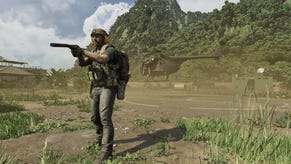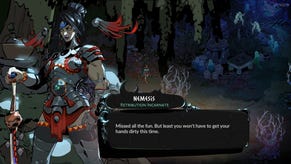Fire Away: Spec Ops, Far Cry 3 Writers On Criticizing FPS
Williams Vs Yohalem, Pt 1
The shooters! They've become self-aware! Now they're in the vents, skittering around menacingly and writing lengthy commentaries on why the very mechanics that make them tick might just be hyper problematic for, you know, society. Two games, especially, have claimed the forefront of this movement and have succeeded to - erm, depending on whom you talk to - varying degrees. If nothing else, however, Spec Ops: The Line and Far Cry 3 should be applauded for aiming right down the sights at a very important topic. Thing is, they furrowed their proverbial brows at shooters in extremely different fashions - Spec Ops by charting a slow descent into bodycount-borne madness, and Far Cry by "straight-faced" (and/or frustratingly obtuse) satire. So, during GDC, I brought their respective writers, Walt Williams and Jeffrey Yohalem, together for a wide-ranging chat about, well, everything. In part one, we talk the industry's emotional disconnect from the realities of shooting, how to critique violence without accidentally glorifying it in the process, getting these critiques past publishers, and tons more. Oh, and of course, beware of SPOILERS.
RPS: First off, let's start with the basics. In taking aim at shooters and shooter culture, where did both of you begin? What was the genesis of your story?
Yohalem: The whole thing was inspired by this idea of, can you make a game that is a warning label about games? Can you do it without being an ironic satire? Because for me, irony is finished, for now. I think the last few years have been about ironic, arm’s-length jokes where you say, “We’re smarter than this thing. We’re making fun of it.” It’s the Family Guy style of humor. I think that what’s happening now – it started with Exit Through The Gift Shop – is this idea of playing with the world itself without blinking.
I had, in college, several experiences with WoW where people that I really admired in the game turned out to have really terrible lives. They were focusing all of their attention on being a good person in the game, while their children were neglected in reality. At one point point someone’s girlfriend came on and basically told us all off in the guild. Her son had touched the stove because his father wasn’t watching the child. He was playing WoW.
When we were pitched a straightforward shooter, I felt the same thing - like there’s a problem with my generation, where escapism is becoming systematized. Especially like Jane McGonigal’s talk at TED about how you can use gamification to manipulate people into doing things. She sees a positive side of it, like, “Oh, this is going to be great for people.” But I also saw all these corporations at that talk with their lists of, “This is how we can get people to do things that they don’t want to do.” I’ve seen people in New Mexico. On Christmas morning they gamble their whole bonus checks away instead of spending Christmas with their kids.
That kind of gamification, to me, is a threat to society. But we work with games because they’re interactive. You can create an experience that allows the player to come to their own conclusions about that. Far Cry was an attempt to say, “Let’s look at these systems and how they make you feel. Then, at the end of the day, you decide whether you like what this has done to your brain.”
Williams: I come from a military family. I spent a very small amount of time in the military before they decided that I was not really for them and vice versa, which was a good call on their part. But I was always close to it. Like, my brother did three tours in Iraq. I have a lot of friends who spent a lot of time in Iraq. My father was in Vietnam. My grandfather was in World War II. Lots of war and fighting, and it’s something that’s affected all of them in various ways.
There’s the level in Modern Warfare where you’re in the plane and everyone’s running from the bombs and machinegunning. We mirrored that in the white phosphorus scene specifically. One of those pilots came and showed us a video – they came to the trainees and showed us what they were doing. There was a part in the video where they were leading a guy. They were using the machinegun to lead him. He was hiding under trucks. You could hear the pilots joking about it on the video. Everyone in the room was laughing. And that seemed very weird to me. I understood that this was someone we were technically at war with, and so the attack was something justified, but the tone and the actions in the attack seemed very off. That a room full of people would find this humorous, something to laugh at.
Admittedly, yes, it’s just a white dot on a black screen. But we were still watching footage of people being killed. This is actual footage of people dying. It’s not funny. That was the moment for me, when I was in the military, where I realized, “I don’t know that this is for me.” Not that I’m anti-military. I’m extremely pro-military. I believe it’s an institution that’s necessary and the people that choose to join it feel a calling. But obviously, it’s just not for me. That’s just always stuck with me.
Originally, it was going to be a straightforward military shooter. That’s how it was pitched by Yager to us. So early in development, we were trying to justify Walker's actions [in a straightforward way] and basically, he was coming across like a complete madman. “Hey, we are three guys. We are incredibly outnumbered in a terrible situation. Let’s track down this specific large group of people and openly assault them. This is gonna work out great!” That was kind of the point where we started to shift the narrative to be about that. Ultimately we realized that the more and more you have a character being proactive in this very violent situation, particularly in a game where you’re always going to be outnumbered by the enemy – you have to be, because you are simply a player and the enemy has to be big enough to fill the entire expanse of the game – there is a level of insanity.
That was the original point in the production where we realized, “There’s something more to this that we want to do.” From that point, it changed to, ultimately, the white phosphorus scene. We wanted to start taking an angle of, instead of you being a hero doing crazy things, what would this kind of stuff actually do to a person. How it starts to weigh on them. The way I’ve seen it in friends who come back, how it weighs on them.
RPS: Hm. You both started with straightforward shooters, but I think you approached the critique from completely opposite angles. With Walker in Spec Ops, he lost more and more control as he went into this spiral. Jason, meanwhile, got more and more powerful. The game mechanics gave him more control. He became a warrior who, expressed in gameplay terms, had all these awesome items and abilities. How did those gameplay arcs shape the story that you told, and the basis of your message?
Williams: It was very much about looking at the expectations of going into a game versus the reality of what you’re doing. How you see yourself when you’re playing a game versus what you actually are, which is where the whole “The Line” part of it came in. We wanted Walker’s journey to be the same as the player’s. For him, that narrative was a man having a crisis of self. He’s coming into a situation with the best of intentions, believing himself to be a hero. The white phosphorus scene is not a point where Walker is being a villain. It is genuinely well-intentioned. It’s just one of the things that can happen in life, particularly in combat, if things turn out for the worst. He can’t reconcile with that.
So by realizing that we wanted to do that for the player, that gave us to the ability to form things like the white phosphorus scene so that it’s ultimately going to be about him in conflict with himself. And if we wanted all the other metaphors and things, then the game does that for us. It has enemies. You’re fighting American soldiers while being an American soldier. The city’s natural sandstorms are literally stripping everything down to the bone, taking away all the glitz and surface of life and leaving simply what it is, kind of wearing everything down.
The result is what you see happening to Walker at the end, where he’s being torn apart to what is at the base of him, which is, put simply, he is a killer. And his ability to connect with that, and how that causes these people to trust him and follow him - who are even worried about him, but are willing to stick with him because he’s someone they care about – it brings them all down to their destruction.
Yohalem: I also think that, based on your talk, the major difference between our two games, in terms of how we’re delivering the meaning, is we both are delivering meaning through the core gameplay. But your meaning is about violence and what it does to you, so it makes sense that the protagonist would get weaker, because as he realizes that, your ability to keep going is decreased. Then you’re creating more obstacles, which works through the gameplay perfectly.
In Far Cry, it’s about systems. It’s about shooting in a game. The system abstracted, what the system does to your brain. In my case, it’s about developing a frenzy, because it’s about addiction. Addiction culminates in an overdose. The game is based on an overdose structure. In other words, you can have a game where you have more and more obstacles. You can have a game where you have more and more power. I think that’s the difference. We both looked at what the studios were making and said, “Okay, here’s how we can create a meaning that’s deeper.”
RPS: For both of you, when, in the process of developing the systems and mechanics, did your story enter the picture? How much did you have to mold your story around a pre-existing game, versus your story being a key part of the way the game was designed? How open was the rest of the development team to what you were doing?
Williams: They were open. Everyone’s open to ideas. But also everyone’s not open to ideas. It’s a creative process. It’s always a back and forth. You give a little, you get a little. Especially working as a writer, you have to learn to work within the box that you’re given, while at the same time finding ways to do what you want to do with as few resources as possible.
Even though narrative was occurring over the course of this thing, budget constraints and things happened. You lose people, you gain people. You go over budget, you get more money, you get more time. You’re constantly having to juggle your resources. Honestly, I get asked a lot, “How does the improving technology make it easier to be a writer?” It makes it harder to be a writer! It makes it worse! Until you’ve had to write something for a cutscene that’s already been made because the team had to start the cutscene before you even got on the project - “could you make whatever words kind of match what they’re saying already so we don’t have to do too much new animation?” - you don’t understand!
You get this whole thing in the game and you’re like, “Wow, this totally doesn’t work. Can we change this cutscene?” “No, we can’t! That needs more resources and we don’t have them at the moment.” It does make it a little bit harder to write. But the team was definitely willing. They'd actually return my moral choices with extra options.
Yohalem: We were developing this open world shooter. So the question becomes, in every other shooter – or any game in an open world – the way that the game pulls you out of the experience has been ignored or papered over. “We don’t understand how to deal with this, so we’ll just do a traditional narrative and ignore what the game is doing.” So I said, “Okay, let’s solve this problem. Let’s use what the team does best.” If you have an actor who’s great at crying on command, you make sure you have a lot of scenes that have crying on command. You don’t say, “Oh, we’re not going to do that, because I have this other idea in my head.” You listen to what’s going on in the team and then you say, “Okay, these are the directions that are strong. The meaning and the direction and where we want to go has to come from there.”
I knew I wanted to talk about the kind of pain going on in my generation now with autonomy. I was looking for ways to talk about that in the game. Then, when I saw the open world versus a linear shooter, I thought, “Okay, you have friends who are in trouble, but they’re not your friends.” We wanted to move fast at the beginning, because we wanted to open the game up right away. Which, as an open world player, I can completely understand. And so it’s like, okay, fast beginning. We don’t have time to get you into who the characters are. That’s not going to happen. The team didn’t want to do that. So, okay, let’s make a new wave game, which is about [shocking people].
New wave cinema is all about shocking the audience repeatedly out of being hypnotically taken into a film. Whenever Francois Truffaut felt like his audience was too relaxed, he would jolt them by doing something with the camera like cutting part of a scene out. That was the direction we took the game in. You don’t know Jason’s friends, but you want to play in the open world, so let’s talk about that. You go to this place and you can play forever. People are screaming for your help and it doesn’t matter, because it’s not you. It’s a puppet that you’re playing. The puppet has a relationship with these people, but you don’t.
So we highlight the alien-ness of that, rather than trying to paper over it. It becomes this new wave experience where you’re constantly jolted out of the narrative systems. It becomes, for me, a modern narrative, as opposed to an old-fashioned narrative that tries to paper over stuff. I feel like, in Spec Ops, you similarly call attention to what people in other games try to deflect attention away from, which is killing. In this case, I’m directing attention towards the systems. They’re both opening up the ventilation shafts and showing the structure of the building.
Williams: Absolutely. Which, I think, is where we’re at as an industry at this point. I agree 100 percent with what Jeffrey said earlier about how we’ve moved beyond irony. The next obvious step for us is sincerity, being honest about the type of things that we make and being honest about how we’ve allowed ourselves to disconnect from our art and forcing ourselves to connect with it again. Once we start being honest and being critical internally of what we make, that’s how you grow up. You have to be able to look honestly at yourself as a person, see where you make mistakes, how you treat people and things like that, if you ever want to grow as a person. What we have to do now as an industry is look and see where we are strongest, where we are weakest, and what we’re lying to ourselves about.
Yohalem: A friend of mine called it, “Turning the lights on in the whorehouse” [laughs]. Getting down in the mud. Irony allows you to stand above the mud and say, “Oh, look at that mud. I’m not involved in making it. I’m laughing at it.” But in reality, you still are. You’re pointing it out. We’re saying we should look at these things as literal faults. How can we fix it? The first step is admitting those faults are there.
RPS: So how do you call attention to those tropes without glorifying them? I think there’s a fine line to walk there when the game that you have essentially, from a mechanical standpoint, is just like all the ones you're trying to critique.
Williams: With us, honestly, what we did – and I feel it’s actually a rather easy thing to do, we just tend not to do it – was to be more realistic about the end result of violence. We didn’t want it to be like, after you kill everyone and everyone drops dead, cutscene, jump to the next zone, that’s it. “Now that everyone’s dead, hooray, we can progress!” We wanted to keep players in the area longer. Keep them around the consequences. Force them to walk through and see the consequences of their actions, and also learn more about the people who were in the world and what they’d been going through. Using the moral choices to contextualize them. Slowing it down so you were interacting more with them more on a one-on-one basis. Showing the consequences of violence, for us, is the easiest thing.
Yohalem: We were actually talking about Inglorious Basterds before you showed up. We were talking about how, if you look at the aftermath of the Holocaust, we can become acclimated to that amount of killing and death. The concentration camps didn’t have stacks of bodies in them, the way that they are in the photographs as the allies came in. They used to function in such a way that the bodies disappeared. The whole system allowed everyone to turn a blind eye to what they were really doing. That’s not an excuse, but if you’ve seen interviews with Nazis, there is that kind of disconnect.
Right now, as an industry, we have disconnected from our central mechanic. We have yet to do a game about what shooting is, about what stabbing is. Both of us were trying to do a game that explores the core of what these mechanics are, because then we have a real medium. The medium is about interacting, about how our actions affect us emotionally. That’s our art. Otherwise this would just be a movie. It would be about watching something or reading something. That’s not games.
I think we haven’t really explored our [language]. The industry keeps wanting more shooting games. It keeps wanting more games that involve sneaking up behind someone and stabbing them. So then I think we both said, “Let’s make a game that explores what that actually means, and how it feels.” But then, once you’ve done that, you can’t really do it again. If we did our jobs, then every other game that’s about that mechanic would feel the same. At that point, people would say, “We want another experience.”
Gaming is a system that’s become unaware of itself. If the first step is awareness, then the question is, do you really want to see that? I think your game very clearly asks that question. “This is what our mechanic is. Do you really want this, again and again and again?”
Williams: I’ll be honest, I was a little worried about the answer. I was worried that the game was going to… You know, you deal with PR. Admittedly Spec Ops was a hard game to sell, because you can’t really sell what it’s actually about.
Yohalem: That’s part of the subtlety. If you’re too outright about it, the company will say, “This is something that we feel uncomfortable putting in stores.”
Williams: Yeah. So I was a bit worried – unfoundedly, it turned out – that PR would try to sell it on the extremeness of the violence or the element of the violence. That would be something that they would use to appeal to people who want that, as a product versus as an experience. We were very lucky that that didn’t happen. Like I said, we have a very good PR department. They’re not so completely off the reservation as to go, “Wow, this is really fucked up! People are going to love it!”
Yohalem: Did you see that commercial for, I think, Call of Duty, that had real people from their work environment shooting? I just stared at my monitor for like two minutes with my mouth open at this commercial. Where it had the secretary firing a gun? We are absolutely disconnected with the concept of what this means.
Williams: I don’t know that it so much has to do with us being part of this gun culture or anything like that. It’s simply that we have made the act of killing and shooting so fun, but we’ve also taken the importance out of it by piling so much of it in. You don’t ever have to think about the concept of pulling a trigger, because even if you run out of bullets, we’re going to give you so many more bullets! So many more people to shoot! In fact, even if all the people in the game aren’t enough, we’re gonna give you Horde mode! You can kill people until you can’t kill them anymore!
Yohalem: We’ll give you resurrected zombies and you can shoot those.
Williams: We’ve turned killing into such an all-or-nothing thing. With Spec Ops, we wanted there to be a very serious aspect of survival horror to it. Ultimately, I don’t think that, in the gameplay department, we succeeded at all. It’s very much a generic shooter. That’s what it needed to be for the overall story to work.
Yohalem: The better that gets, the more your story works. It’s the acting thing. You support your actor’s great mechanic.
Williams: But I do think a shooter built with real survival horror mechanics at its core – the lack of ammo, having to think about whether I want to use this bullet if there’s another option – and not set against zombies or zombie dogs or something, but real people in real combat situations, or just a real-life dangerous kind of situation, would go a long way towards us understanding a bit more about the act of shooting.
I was talking to some French journalists yesterday, and they brought up an interesting point that I’d never thought about, about the emerging game development communities around the world and what I thought it was going to be like when, say, people from Africa or other parts of the world where they have lived under violence and the effects of violence their whole lives, would begin to make games. If they made shooters, how different from our shooters would they be? I had not thought about that, and I think that also is going to be a big turning point. Violence in western games is very much about power and addiction and going further and further. That’s because we haven’t grown up with it at all. We’ve grown up seeing it on TV. We’ve grown up with stories. We’re totally removed from it. That’s why, to me, it’s a gameplay loop.
Yohalem: You’re approaching that from this incredible life experience, too, where you’ve actually been exposed to violence. I haven’t. I’m writing about this gameplay loop and how that messes with your brain chemistry. You’re talking about actual combat. I think these are two sides of the same issue. It’s pretty interesting. I would love to play a game where you kill 10 people. Each one means something, and that’s it. Like, when I fire a gun, no bullets. And if I do that, it’s one of the climaxes in the game, because it means something.
Check back in the coming days for parts two and three of this massive discussion, in which we continue to dissect pretty much every conceivable thing relevant to shooters, their place in modern culture, and why we should maybe be feeling a bit nauseated by that. Highlights include: questioning if we even need authors and meaning in virtual worlds, arguing about Far Cry 3's approach to satire, tackling how to write a personal story when you're working with "someone else's millions of dollars," and why BioShock Infinite - of all things - might be the successor to what Williams and Yohalem have attempted to set in motion.
















